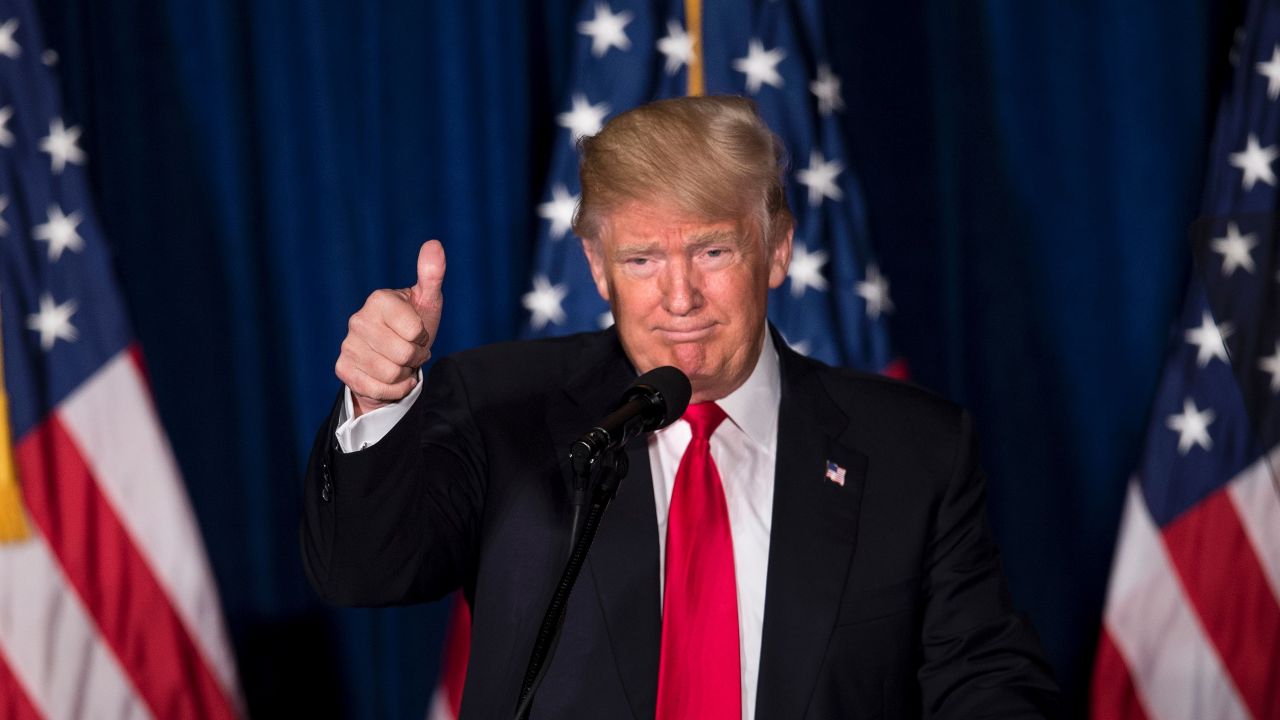
Republican presidential candidate Donald Trump at the Mayflower Hotel in Washington, DC on April 27, 2016. Trump met with House Speaker Paul Ryan (R-WI) and other Republicans on May 12. Ryan has yet to endorse Trump despite his being final candidate in the race. (Photo by Brendan Smialowski, AFP/Getty Images)
So much for shaking up the political establishment.
Donald Trump, whose entire candidacy has been premised on doing just that, has delivered the opposite. He has come forth with a slate of people he might nominate for the Supreme Court. It reads like a conservative Republican dream team, packed with judges who were donors to GOP candidates or clerks for conservative heroes like Justices William Rehnquist and Clarence Thomas, before themselves succeeding to the bench. A number have made rulings against abortion or gun control.
There’s nothing the least bit anti-establishment or original about it, except perhaps for the not-very-judicial anti-Trump tweets of Justice Don Willett of the Texas Supreme Court.
It is not that these potential nominees are unqualified. Most attended good law schools — Yale, Chicago, Georgetown, Northwestern; worked in responsible positions in government like the White House and the Justice Department; and have considerable judicial experience on excellent courts.
And it is not that their conservative credentials necessarily disqualify them, although consistent knee-jerk conservative (or liberal) rulings in cases can raise questions about objectivity and faithfulness to the law. Often in the law, the legal answer to a litigated issue is unclear and depends on the judicial philosophy of judges. Both “liberal” and “conservative” judicial philosophies have legitimate places in our legal system, as long as they are not knee-jerk or extreme.
Rather, the regrettable thing about Trump’s proposed slate of justices is that it appears to have been compiled with an ulterior motive. His obvious basis for choosing these people is not that Trump thinks they would be the best, but because he needs to gain the support of the Republican Party regulars who question his conservatism.
These potential Supreme Court nominees were picked to mend fences with the Republican Party and to establish Trump’s conservative bona fides. Mending fences is good. But Supreme Court nominees should not be the hammer and nails with which to do it. Perhaps if the horizons had been broader and the search conducted only for quality, there would have been a bit more diversity in the slate.
As a student and teacher of the law, particularly the judicial process, I find regrettable the ever-increasing political gamesmanship attending the nomination and appointment of Supreme Court justices. The Trump nominee list, ostensibly occasioned by the demise of Justice Antonin Scalia, is merely the most recent episode.
Even before Scalia was laid to rest, Senate Republicans announced they would not consider any replacement for him nominated by President Obama. They probably understood the natural reaction of Obama would be to name someone more centrist than he might otherwise choose. That too represents political calculus. In tapping Judge Merrick Garland, a relative moderate with superb credentials, Obama has made the Republican-controlled Senate’s refusal to consider the nominee seem that much more unreasonable.
But I think the Republicans may be cleverer than they appear. In the short term, they win the applause of hard-core members of their party for this uncompromising stand against Obama. Further, Republicans know that even if Democrats win the White House and make significant gains in the Senate, there will still be time, in a lame-duck session, for the existing Senate to confirm Garland, preventing a President Hillary Clinton or Bernie Sanders from nominating someone more liberal. This seems like gamesmanship that should not attend something as important as selecting Supreme Court justices.
But it’s a part of the political process that Trump, with his list of potential justices, seems determined to continue.
As the Republican nominee-apparent himself often says: Sad!




